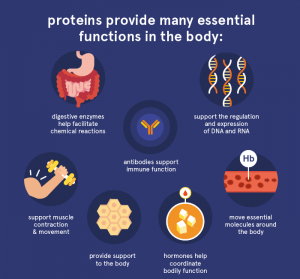Role of Proteins in Human Body

Introduction:
In this article I will discuss about that rule of proteins in human body. our body require protein for growth quickly. Protein is another important macromolecule that makes a bulk of the human body. It has its major role in the growth and development of human body. It is usually the polymer of amino acids. Usually 20 types of amino acids are responsible for protein formation. Out of these 10 are essential that are to be provide in daily diet and 10 are non-essential that our body can make on its own. Proteins are very important for the development and growth of our body as about 50% dry mass of cell is make up of protein. In this article. They have great importance from the nutrition point of view. Their major roles and functions along with their some important aspects in our body will be discusse in this article.
Essential amino acids:|Role of Proteins in Human Body
You should have the knowledge of those amino acids and that you must supplement in your diet so that you may choose the correct food containing a those amino acids for your meal plan; These are:
Arginine
Isoleucine
Methionine
Leucine
Lysine
Phenylalanine
Threonine
Tryptophan
Valine
Histidine
Distribution of proteins in human body:
Protein is an abundant component of human body. After water, it is the second most abundant macromolecule. Only urine and bile are those fluids that don’t normally contain protein. Distribution of protein in our body is such like that:
Muscles 33%
Bones and cartilage 20%
Skin 10%
Tissues and body fluids 37%
Functions of protein in human body:
Dietary proteins provide amino acids that play their role in the body building and in the maintenance of tissues. Some other important functions of proteins are as follows:
Control of acid-base balance:
Proteins and amino acids act as buffers to maintain the acid-base balance of our blood. During normal metabolism, both acids or bases are form but the amount of acids predominate the bases. Their regulation in our body is do only from proteins and amino
acids| Role of Proteins in Human Body
Builders of Enzymes, Hormones and Antibodies:
Proteins act as the building blocks of enzymes, hormones and antibodies. All enzymes are globular proteins. As you know that our life will cease without enzymes. So, from this point of view proteins are essential. Hormones are responsible for the regulation of many body processes e.g. feed-back mechanism mostly that include the maintenance of body temperature at 37 degree Celsius, because the regulation of blood sugar level or the process of digestion etc. All the antibodies that protect us from the antigens or the foreign and particles are also protein in nature.
Body building:
Although protein is present in each and every cell but have different behavior in various tissues. For example;
The protein in the muscle allows it to contract and hold fluid. This gives the muscle their strength and integrity to maintain their shape and functioning even when they muscles are compose of about 75% water.
The protein in nails, skin and hair is hard and insoluble, providing a protective covering for the body.
Proteins in the walls of blood vessels provide elasticity, which is essential for maintaining normal blood pressure and blood flow.
Proteins provide the framework in which the mineral matter of bones and teeth is embedder.
Cell organelle formation:
Almost all the organelles of cells are composed of proteins mitochondria, ribosomes, endoplasmic reticulum etc.
Proteins form the cell membrane that is involved in the cellular transport. that So, proteins also have a very selective role and acts as a selector for the incoming and outgoing particles across the cell membrane. In this way, cell membrane acts as a selectively permeable membrane.
Proteins also form the protoplasm of the cell that is the living and most functional part of the cell.
Energy provider:
One gram of protein provides approximately 4 kcal (17 kJ) of energy when is oxidized. When total energy intake is inadequate, to meet the need for energy, dietary protein is used. Therefore, in this condition, when the proteins are being used for energy purposes rather their real function the body protein is started to be dissolved and the affected person’s body becomes skinny and lean. This mal-usage of protein leads to many diseases such as kwashiorkor, marasmus etc.
Conclusion:.
proteins play their major role in our body as in the processes of growth and development. so They should be used only for their own function purpose when they are lead to many complications.


























+ There are no comments
Add yours